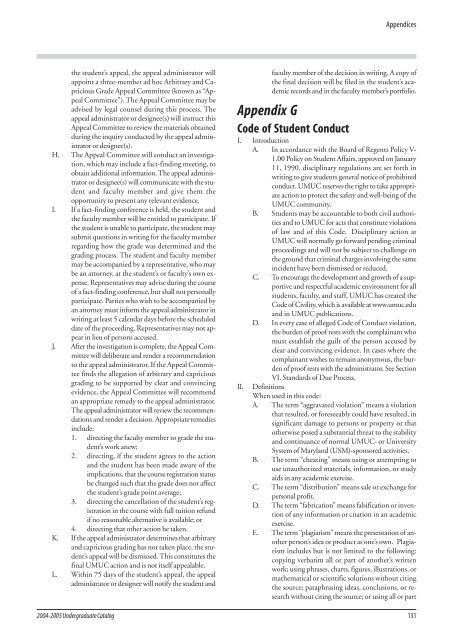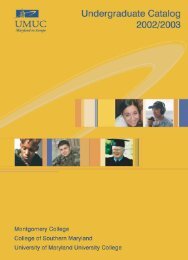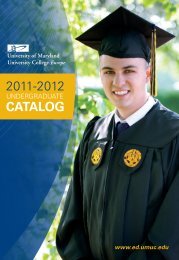Statements of Policy - UMUC Europe
Statements of Policy - UMUC Europe
Statements of Policy - UMUC Europe
You also want an ePaper? Increase the reach of your titles
YUMPU automatically turns print PDFs into web optimized ePapers that Google loves.
the student’s appeal, the appeal administrator will<br />
appoint a three-member ad hoc Arbitrary and Capricious<br />
Grade Appeal Committee (known as “Appeal<br />
Committee”). The Appeal Committee may be<br />
advised by legal counsel during this process. The<br />
appeal administrator or designee(s) will instruct this<br />
Appeal Committee to review the materials obtained<br />
during the inquiry conducted by the appeal administrator<br />
or designee(s).<br />
H. The Appeal Committee will conduct an investigation,<br />
which may include a fact-finding meeting, to<br />
obtain additional information. The appeal administrator<br />
or designee(s) will communicate with the student<br />
and faculty member and give them the<br />
opportunity to present any relevant evidence.<br />
I. If a fact-finding conference is held, the student and<br />
the faculty member will be entitled to participate. If<br />
the student is unable to participate, the student may<br />
submit questions in writing for the faculty member<br />
regarding how the grade was determined and the<br />
grading process. The student and faculty member<br />
may be accompanied by a representative, who may<br />
be an attorney, at the student’s or faculty’s own expense.<br />
Representatives may advise during the course<br />
<strong>of</strong> a fact-finding conference, but shall not personally<br />
participate. Parties who wish to be accompanied by<br />
an attorney must inform the appeal administrator in<br />
writing at least 5 calendar days before the scheduled<br />
date <strong>of</strong> the proceeding. Representatives may not appear<br />
in lieu <strong>of</strong> persons accused.<br />
J. After the investigation is complete, the Appeal Committee<br />
will deliberate and render a recommendation<br />
to the appeal administrator. If the Appeal Committee<br />
finds the allegation <strong>of</strong> arbitrary and capricious<br />
grading to be supported by clear and convincing<br />
evidence, the Appeal Committee will recommend<br />
an appropriate remedy to the appeal administrator.<br />
The appeal administrator will review the recommendations<br />
and render a decision. Appropriate remedies<br />
include:<br />
1. directing the faculty member to grade the student’s<br />
work anew;<br />
2. directing, if the student agrees to the action<br />
and the student has been made aware <strong>of</strong> the<br />
implications, that the course registration status<br />
be changed such that the grade does not affect<br />
the student’s grade point average;<br />
3. directing the cancellation <strong>of</strong> the student’s registration<br />
in the course with full tuition refund<br />
if no reasonable alternative is available; or<br />
4. directing that other action be taken.<br />
K. If the appeal administrator determines that arbitrary<br />
and capricious grading has not taken place, the student’s<br />
appeal will be dismissed. This constitutes the<br />
final <strong>UMUC</strong> action and is not itself appealable.<br />
L. Within 75 days <strong>of</strong> the student’s appeal, the appeal<br />
administrator or designee will notify the student and<br />
Appendices<br />
faculty member <strong>of</strong> the decision in writing. A copy <strong>of</strong><br />
the final decision will be filed in the student’s academic<br />
records and in the faculty member’s portfolio.<br />
Appendix G<br />
Code <strong>of</strong> Student Conduct<br />
I. Introduction<br />
A. In accordance with the Board <strong>of</strong> Regents <strong>Policy</strong> V-<br />
1.00 <strong>Policy</strong> on Student Affairs, approved on January<br />
11, 1990, disciplinary regulations are set forth in<br />
writing to give students general notice <strong>of</strong> prohibited<br />
conduct. <strong>UMUC</strong> reserves the right to take appropriate<br />
action to protect the safety and well-being <strong>of</strong> the<br />
<strong>UMUC</strong> community.<br />
B. Students may be accountable to both civil authorities<br />
and to <strong>UMUC</strong> for acts that constitute violations<br />
<strong>of</strong> law and <strong>of</strong> this Code. Disciplinary action at<br />
<strong>UMUC</strong> will normally go forward pending criminal<br />
proceedings and will not be subject to challenge on<br />
the ground that criminal charges involving the same<br />
incident have been dismissed or reduced.<br />
C. To encourage the development and growth <strong>of</strong> a supportive<br />
and respectful academic environment for all<br />
students, faculty, and staff, <strong>UMUC</strong> has created the<br />
Code <strong>of</strong> Civility, which is available at www.umuc.edu<br />
and in <strong>UMUC</strong> publications.<br />
D. In every case <strong>of</strong> alleged Code <strong>of</strong> Conduct violation,<br />
the burden <strong>of</strong> pro<strong>of</strong> rests with the complainant who<br />
must establish the guilt <strong>of</strong> the person accused by<br />
clear and convincing evidence. In cases where the<br />
complainant wishes to remain anonymous, the burden<br />
<strong>of</strong> pro<strong>of</strong> rests with the administrator. See Section<br />
VI. Standards <strong>of</strong> Due Process.<br />
II. Definitions<br />
When used in this code:<br />
A. The term “aggravated violation” means a violation<br />
that resulted, or foreseeably could have resulted, in<br />
significant damage to persons or property or that<br />
otherwise posed a substantial threat to the stability<br />
and continuance <strong>of</strong> normal <strong>UMUC</strong>- or University<br />
System <strong>of</strong> Maryland (USM)-sponsored activities.<br />
B. The term “cheating” means using or attempting to<br />
use unauthorized materials, information, or study<br />
aids in any academic exercise.<br />
C. The term “distribution” means sale or exchange for<br />
personal pr<strong>of</strong>it.<br />
D. The term “fabrication” means falsification or invention<br />
<strong>of</strong> any information or citation in an academic<br />
exercise.<br />
E. The term “plagiarism” means the presentation <strong>of</strong> another<br />
person’s idea or product as one’s own. Plagiarism<br />
includes but is not limited to the following:<br />
copying verbatim all or part <strong>of</strong> another’s written<br />
work; using phrases, charts, figures, illustrations, or<br />
mathematical or scientific solutions without citing<br />
the source; paraphrasing ideas, conclusions, or research<br />
without citing the source; or using all or part<br />
2004-2005 Undergraduate Catalog 131






